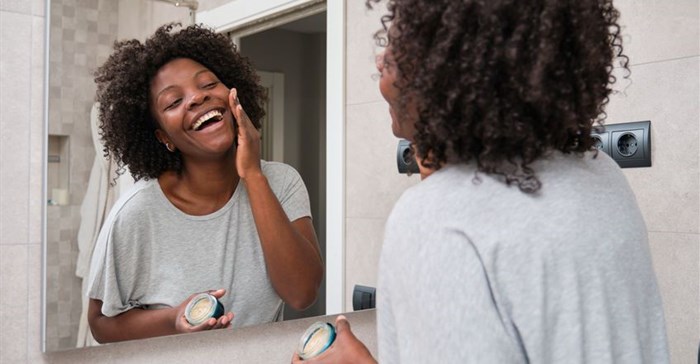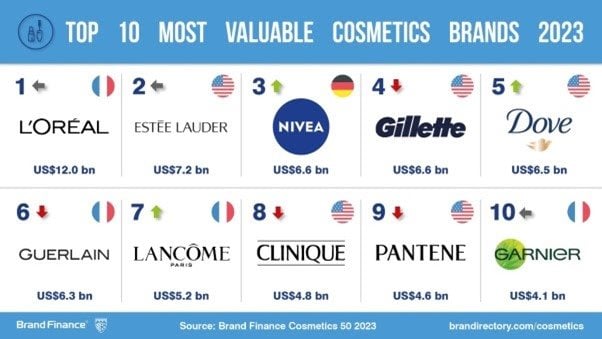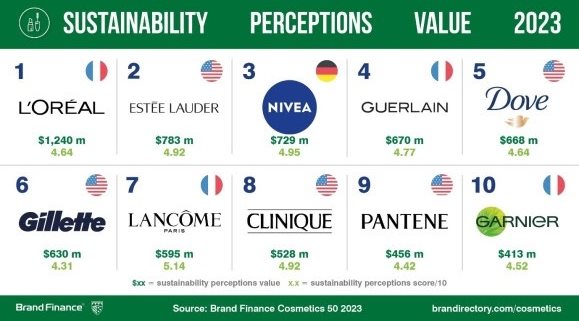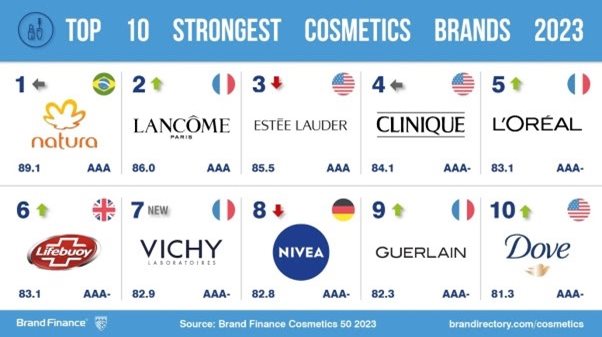
Top stories






More news

Marketing & Media
Ads are coming to AI. Does that really have to be such a bad thing?















Its focus on this, as well as its digital transformation, has made L'Oréal (brand value up 7% to $12bn) this year’s world’s most valuable cosmetics brand in The Brand Finance Cosmetics 50 ranking.
Its digital transformation and sustainability practices are key factors in its number-one ranking.
“L'Oréal has once again come out on top, and Hieronimus has an ambitious and strategic vision for the giant’s future. The L'Oréal brand must continue to prioritise innovation, sustainability and digital transformation as it continues to expand its influence across the globe in the coming yearsc,” omments Annie Brown, director of Brand Finance.
Every year, leading brand valuation consultancy Brand Finance puts 5,000 of the biggest brands to the test, and publishes over 100 reports, ranking brands across all sectors and countries. The world’s top 50 most valuable and strongest Cosmetics brands are included in the annual Brand Finance Cosmetics 50 2023 ranking.

As one of the world’s most popular and well-known cosmetics brands, L’Oréal operates in over 150 countries and has a global portfolio of over 30 brands.
Following the appointment of a new CEO in 2021, Nicolas Hieronimus, L’Oréal has also expanded its efforts in digital transformation and sustainability.
In its analysis, Brand Finance has determined that the key measures of familiarity and consideration towards L’Oréal have increased.
This increase may be attributed to the company’s digital marketing strategies and enhanced online presence. By leveraging its enormous social media following, (over 10 million followers on Instagram and 438k+ followers on TikTok) the brand has enhanced its familiarity amongst younger consumers, producing visually appealing content that is often led by popular influencers.
Further, L’Oréal also boasts an innovative and continually expanding product range, a key attribute identified in the investment pillar of its brand strength.
In 2023, L'Oréal launched two new technology prototypes at CES 2023: HAPTA, a handheld computerised makeup applicator designed for people with limited hand and arm mobility, and L'Oréal Brow Magic, an electronic eyebrow makeup applicator that enables users to achieve a personalised brow look within seconds.

As part of its analysis, Brand Finance assesses the role that specific brand attributes play in driving overall brand value.
Brand Finance assesses how sustainable specific brands are perceived to be, represented by a ‘Sustainability Perceptions Score’. The value that is linked to sustainability perceptions, the ‘Sustainability Perceptions Value (SPV),’ is then calculated for each brand.
Given the increasing importance of sustainability in the perception of cosmetics companies, it is unsurprising that the world's largest cosmetics company has once again topped the rankings, with an SPV of $1.24bn.
In addition, L'Oréal has been recognised by Ethisphere as one of the world's most ethical companies for the 14th time. In recognition of the brand’s CEO efforts to promote environmental responsibility, diversity, equity, and inclusion in the fragrance industry, the Fragrance Foundation will award Hieronimus with the Hall of Fame award in June 2023.
Steps taken by the French giant towards sustainable innovation include promoting sustainable formulae in its products, producing environmentally friendly packaging, and reducing waste and carbon emissions across its operations.
It should be emphasised that the brand’s position at the top of the SPV table is not an assessment of its overall sustainability performance, but rather indicates how much brand value it has tied up in sustainability perceptions.
L'Oréal’s Sustainability Perception Score was also relatively high, at 4.64/5. While L’Oréal may not be perceived as the most sustainable brand compared to those with sustainability embedded in their core mission, (e.g., Botanical cosmetics company, Yves Rocher, scoring 5.87/10, and Natura, scoring 5.29/10) the company has made, and is perceived as making, significant strides towards a greener future.
Yves Rocher (brand value down 9% to $2.3 billion) has achieved the highest Sustainability Perceptions Score in the Cosmetics 50 2023 report, at 5.87/10.
Since its founding, Yves Rocher has remained committed to its sustainability mission. Its efforts were solidified by the establishment of the Yves Rocher Foundation in 1991, which has successfully planted more than 100 million trees worldwide in 2023.

Chinese beauty giant, Chando, is the fastest growing cosmetics brand of 2023. The Chinese beauty giant, (brand value up 36% to $1.3bn) has taken the beauty world by storm with its innovative branding and unique products. This increase may be attributed to growing Chinese and global demand for luxury products at affordable prices.
The company establishes a unique brand identity by offering a diverse range of products including skincare, fragrances, and home goods.
Its Himalayan-inspired branding also holds significant appeal in its local market. As a result, Brand Finance research finds that familiarity and consideration for the brand have improved in China, contributing to its increased brand value and overall ranking, at 38th in 2022 and 32nd in 2023.
Chando is also perceived as a leading brand in sustainable and ethical business practices. Through measures such as endorsing renewable energy sources and promoting eco-friendly packaging, Chando is attracting a rapidly growing crowd of ethically conscious consumers.
L’Oréal 's Maybelline New York (brand value up 30% to $4bn) is the second fastest growing cosmetics brand of the year. Skincare giant Vichy, part of the L’Oréal family, has made a comeback, ranking 7th for fastest growing cosmetics brand.
Notably, La Roche-Posay (brand value up 19% to $1bn) shines eight spots ahead of Vichy in 39th spot, and its products continue to be perceived as innovative, high-quality, affordable, and eco-friendly.

In addition to calculating brand value, Brand Finance also determines the relative strength of brands through a balanced scorecard of metrics evaluating marketing investment, stakeholder equity, and business performance.
Compliant with ISO 20671, Brand Finance’s assessment of stakeholder equity incorporates original market research data from over 100,000 respondents in 38 countries and across 31 sectors.
Natura is sitting pretty as the world’s strongest cosmetics brand, with a Brand Strength Index (BSI) of 89.
As Brazil's top cosmetics company, Natura (brand value down 18% to $2bn) is renowned for its commitment to ethical and sustainable practices.
Brazilian consumers have a strong connection to the company's South American heritage and appreciate its efforts to preserve the Amazon Rainforest.
In addition to its sustainability focus, Natura has positioned itself as a cruelty-free brand. This endeavour has further solidified the company's reputation as an industry leader in sustainability.
As per Brand Finance's research, sustainability and transparency play a crucial role in shaping the reputation of cosmetics brands. Natura's unwavering commitment to these values is a driving force behind its continued success and popularity among consumers.
M.A.C Cosmetics (brand value down 19% to $2.7bn) has dropped five places in the ranking since 2022 and is now ranked 17th. More alarmingly, its brand value has dropped by a total of 39% from $4.4bn since the beginning of the pandemic period.
Fierce competition and shifting consumer preferences may have diminished M.A.C's brand value. The company is a subsidiary of Estée Lauder (brand value down 10% to $7.2bn), ranked 2nd this year.
The giant has several other high-end brands under its umbrella, including Smashbox, Clinique, and Bobbi Brown, the latter two competing with M.A.C in this year’s table. Notably, Clinique (brand value down 20% to $4.8bn) is ranked nine spots ahead of MAC in 8th position.
While M.A.C has built a brand of vibrant and daring makeup options, Brand Finance research finds that consumers are choosing what they perceive to be as more natural alternatives.
Clinique's branding highlights simplicity and gentleness, and its vast range of skincare and makeup products are also perceived as gentle and high-quality. This more subdued aesthetic endorsed by Clinique could potentially appeal to a wider range of consumers than the bolder aesthetic favoured by M.A.C.
The South Korean cosmetics industry is facing a setback as Innisfree has dropped out of the 2023 ranking entirely. Ranked 41st in both the 2021 and 2022 rankings, Innisfree has witnessed a decline in its brand value by almost half.
The other two South Korean brands in this year's ranking, Sulwhasoo and The History of Whoo, have also struggled. Sulwhasoo's brand value has decreased by 11% to $1.3bn, while The History of Whoo has seen a considerable drop in brand value of 18% to $1.2bn.
Research suggests that the Covid-19 pandemic significantly affected the nation’s cosmetics industry. Further, in 2022, Innisfree reportedly planned to close 80% of its physical stores in mainland China.
As the world’s second-largest beauty market, Chinese consumers have a growing interest in locally made products as well as having more access to global brands.
As the Chinese cosmetics industry continues to grow, it will be crucial for foreign brands to understand and adapt to these changes in order to remain competitive.
View the Brand Finance Cosmetics 50 Ranking.